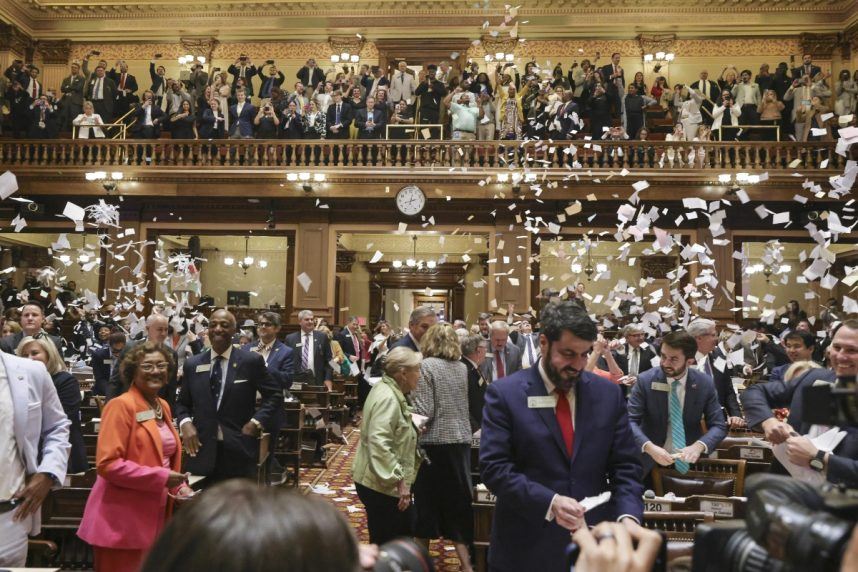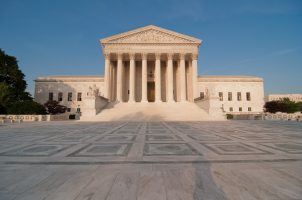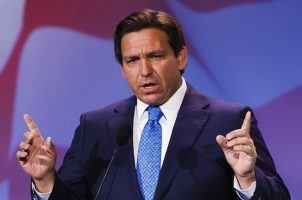Georgia Lawmaker Pursues Sports Betting, Casinos
Posted on: December 7, 2023, 03:20h.
Last updated on: December 8, 2023, 06:13h.
If some lawmakers have their way, voters in Georgia may have an opportunity next year to decide whether to welcome casinos, racetracks, and mobile sports betting to the state.

State Sen. Brandon Beach (R-Alpharetta) says he plans to introduce a bill as soon as the legislature convenes in January that would place a gambling measure on the state ballot next year. Beach wants to bring three casino resorts, a pari-mutuel race track, and mobile sportsbooks to the Peach State.
If we were able to do three destination resorts and one racetrack and sports betting, you’re talking about $900 million in revenue to the state,” Beach said at a Wednesday meeting of the legislature’s Joint Economic Development and Tourism Committee, of which he is the cochairman.
Beach’s proposed legislation would ask voters whether they want to amend the Georgia constitution to authorize the new games. He noted that sports betting and casinos are legal in many neighboring states, costing Georgia tourism and economic development opportunities.
Georgia Tourists
During a recent visit to the Harrah’s Cherokee Casino Resort in North Carolina, about an hour’s drive from the state border, Beach said he noticed that 85% of the cars in the parking lot had Georgia license plates.
We are funding North Carolina’s education system with Georgia license plates up there gaming,” he said. “So I think it’s something we have to let the voters decide.”
Beach says his goal is to see Atlanta eventually host a luxury casino resort, pointing to the Wynn Encore Boston Harbor as an example of what he hopes to see.
“I don’t want a Las Vegas Strip. But what I do want is a Wynn-type facility that is a destination,” Beach said. He anticipated a casino resort would include an entertainment venue, spa, restaurants, and high-end retail brands like Versace and Gucci.
Funding for Infrastructure, Education
The legislation Beach discussed Wednesday was circulated to committee members in draft form. But he said it may be tweaked before being introduced.
The legislation would direct proceeds from casinos, racing, and sports betting to several priorities, including infrastructure development, health care, and education, Beach said at the meeting.
Half of the proceeds would flow into a Freight and Logistics Fund, aimed at improving roads, bridges, and rail access in key priority areas, such as around the Port of Savannah.
The other half would be split between health care and education, with 20% going to a rural health care fund, 20% going to address gambling addiction and mental health, and 10% going to a fund dedicated to the state’s Historically Black Colleges and Universities.
Beach said he may also include language in the legislation that would use some of the gambling proceeds to establish a fund designed to attract marquee events, such as the Super Bowl or Final Four, to Georgia. He said Texas has a $100 million state fund to attract such events, whereas organizers have had to privately fundraise in previous efforts to bring big events to Georgia.
If voters approve the proposed constitutional amendment, the legislature would be directed to pass legislation to establish a new gaming commission that would regulate the activity.
Next Steps
The Georgia legislature is currently meeting in a special session convened by Gov. Brian Kemp (R) to consider new electoral maps and a handful of other narrow issues, so Beach cannot introduce his bill until the next regular session convenes on January 8.
Georgia is seen as one of the best hopes for an expansion of sports betting in 2024 after similar efforts stalled in previous sessions.
Still, it remains to be seen whether casinos and pari-mutuels will also come along for the ride. Sports betting may be more likely to see success in the state, and it may not require a new constitutional amendment.
Related News Articles
Florida Sports Betting Compact Opponents Take Case to US Supreme Court
Anti-Gambling Group Adds Voice to Florida Sports Betting Case
Gov. Ron DeSantis Defends Florida Sports Betting Compact
Most Popular
Mirage Las Vegas Demolition to Start Next Week, Atrium a Goner
Where All the Mirage Relics Will Go
Most Commented
-
Bally’s Facing Five Months of Daily Demolition for Chicago Casino
— June 18, 2024 — 12 Comments
















Last Comment ( 1 )
Atlanta would be a very attractive state with casinos. People from Georgia spend millions of dollars daily/yearly. People will still gample, it's a sport so why not leave the money in Ga instead making other states rich.